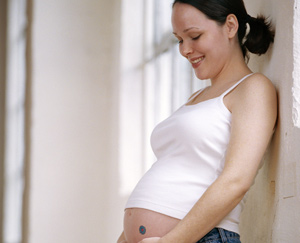Pregnant? Caffeine May Affect Fetal Growth

Adding to the argument against caffeine use in pregnancy
Prior studies have linked caffeine to increased risk of miscarriage, fetal death, and low birth weight, though results have been inconsistent.
In this study, researchers explored the link between caffeine intake from coffee and tea and the impact on fetal growth among 7,346 pregnant women from the Netherlands. Women filled out questionnaires during their pregnancy about the amount of coffee and tea they drank. Fetal growth was monitored by ultrasound during each trimester of pregnancy. In this study, each unit of caffeine reflects caffeine exposure equal to 1 cup of caffeinated coffee (90 mg caffeine). Results showed:
- Women who drank 6 or more caffeine units per day (540 mg or more of caffeine) were more likely to have fetuses with smaller length growth during each trimester and smaller birth length compared with women who drank no caffeine during pregnancy.
- Women who drank 6 or more caffeine units per day tended to have an increased risk of their infants being born small for their gestational age compared with women who drank no caffeine.
- There was no link between caffeine intake and fetal head size or estimated fetal weight during any trimester, and no link was found between caffeine intake and the risk of premature birth.
The bottom line
Say the authors, “Caffeine intake might selectively affect bone and skeletal development. Further follow-up studies are needed that focus on the effects of fetal caffeine exposure on postnatal skeletal and bone measurements.”
The American College of Obstetricians and Gynecologists states that moderate caffeine intake—200 mg a day or the equivalent of two 8-ounce cups of brewed coffee—does not appear to lead to miscarriage or premature birth. The College comments that it is not clear whether caffeine increases the risk of having a low-birth-weight baby. The organization advises that limiting caffeine is good for several reasons during pregnancy including the fact that it may interfere with sleep, increase nausea, lead to more frequent urination and as a result, increase the risk for dehydration. The bottom line? Check with your doctor about the amount of caffeine that is appropriate for you.
How much caffeine is in the beverages you drink?
Do you know how much caffeine you are drinking each day? Caffeine amounts aren’t normally listed on product labels, so it is important to educate yourself about typical amounts found in beverages and food. Although this study looked at caffeine from coffee and tea, many other beverages and foods and even supplements or medications that may contain caffeine.
Also, it is important to know that all coffee and tea is not created equally: the amount of caffeine may vary from beverage to beverage depending on the type of coffee beans or tea leaves used, whether it is caffeinated or decaffeinated, and whether extra caffeine has been added through the addition of other ingredients such as chocolate or kahlua, for instance.
The International Food Information Council Foundation estimates the caffeine content of common beverages as follows:
- One 8-ounce cup of brewed coffee (drip method) may range from 65 to 120 mg of caffeine or more depending on the way the coffee is brewed, the plant and the brand; decaffeinated coffee may contain 2 to 4 mg of caffeine
- One 8-ounce cup of brewed tea (major US brands) may range from 20 to 90 mg of caffeine, imported brands may contain more caffeine; one 8-ounce glass of ice tea may contain 9 to 50 mg of caffeine
- One 8-ounce glass of a soft drink may contain between 20 to 40 mg of caffeine or more; and one 8-ounce cup of prepared cocoa 3 to 32 mg
(Am J Clin Nutr 2010;91:1691–8)
Copyright © 2026 TraceGains, Inc. All rights reserved.
